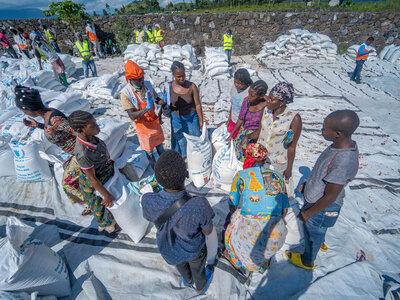Democratic Republic of the Congo
- 26.6 million
- people facing acute food insecurity from January 2026
- 5.28 million
- people are internally displaced
- 112.8 million
- population
The Democratic Republic of the Congo (DRC) hosts one of the largest hunger crises in the world. Hunger and violence fuel one another, with armed conflict and widespread displacement prevailing for the past 25 years. Multiple other health, weather and economic crises compound humanitarian challenges.
A total 26.6 million people are experiencing crisis and emergency levels of food insecurity, and 3.2 million are stunted due to chronic malnutrition – with impaired growth and development.
The hunger crisis is particularly severe in the conflict-affected eastern provinces of North Kivu, South Kivu, Ituri, and Tanganyika, where 3 million people are expected to face emergency levels of food insecurity in 2026.
Around 1.1 million Congolese nationals are refugees in neighbouring countries. At the same time, DRC – already struggling with internal conflict – hosts over 518,000 refugees and asylum seekers who have fled violence in neighbouring countries, mainly the Central African Republic, Rwanda, Burundi and South Sudan.
The World Food Programme supported 5.3 million people with food, cash, malnutrition support and resilience interventions in 2024. In the context of escalating conflict, fluctuating food security and severe funding shortages, WFP is revising its planning to meet increasing needs.
What WFP is doing in the Democratic Republic of the Congo
-
Crisis response
-
WFP reached 5.3 million people with life-saving support, including food, cash and nutrition assistance in 2024. There was a particular emphasis on reaching women, who comprised 53 percent of recipients. WFP’s efforts in addressing the hunger crisis are evolving to provide life-saving food assistance while transitioning towards development activities and long-term, food-security initiatives.
-
Resilience in local communities
-
Nutrition
-
School meals
-
United Nations Humanitarian Air Service (UNHAS)
-
Support to humanitarian coordination
Democratic Republic of the Congo news releases
Go to pagePartners and donors
Find out more about the state of food security in Democratic Republic of the Congo
Visit the food security analysis pageOperations in Democratic Republic of the Congo
Contacts
Office
116, Boulevard du 30 Juin, Immeuble MIBA – Gombe, Kinshasa, the Democratic Republic of the Congo
Kinshasa,
Congo - Kinshasa







